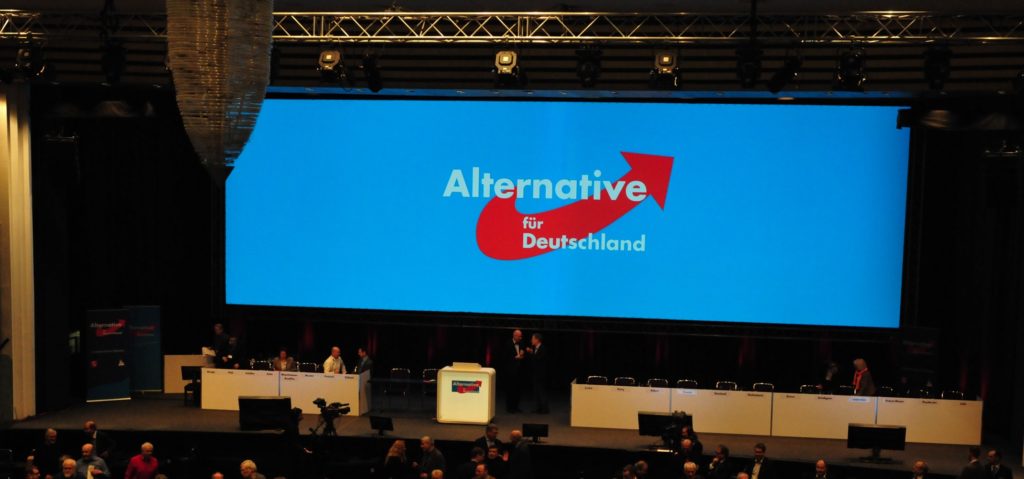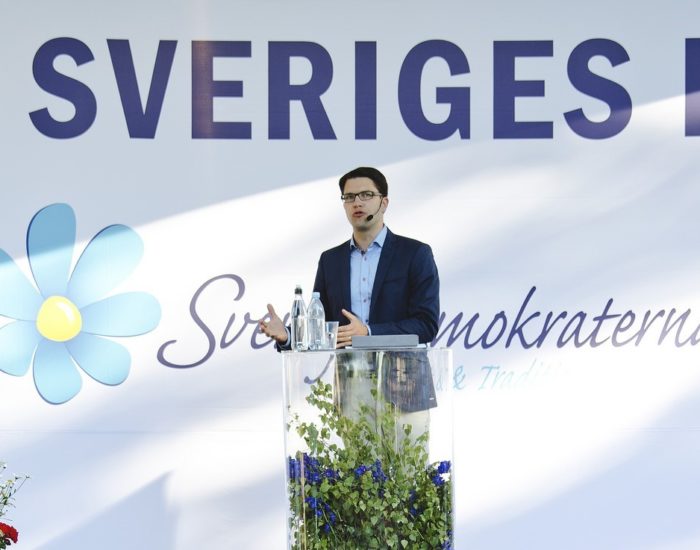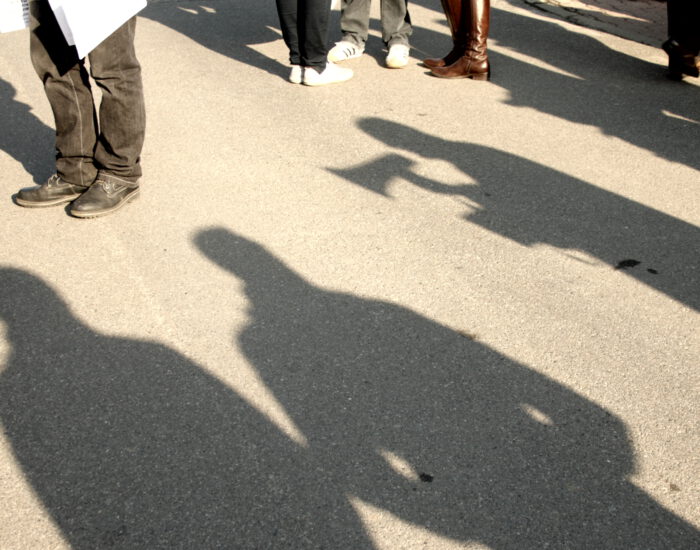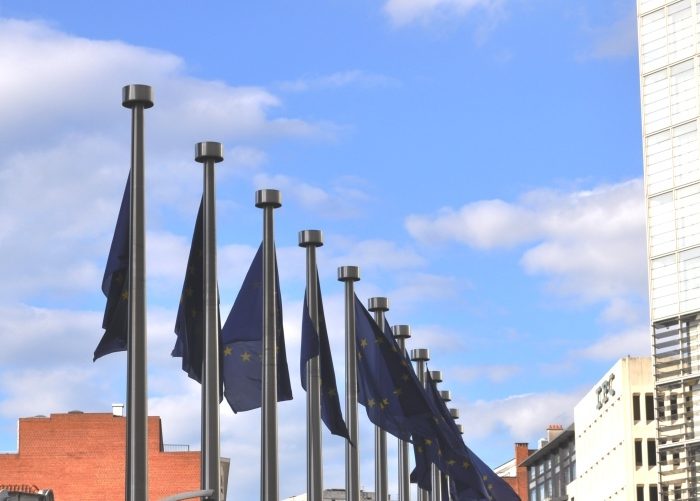The ‘illusionary giant’ of German politics: the AfD
By Timo Lochocki.
Four reasons why the AfD’s polling might collapse over the next year

The right-wing populist Alternative for Germany (AfD) seems unstoppable. In September they won 20.8% at the regional elections in rural Mecklenburg-Vorpommern and 14.2% in Berlin. If elections for the Bundestag would be held today, the INSA poll of September 27 finds that 15.5% of German voters would vote AfD. The party never had higher support rates.It seems Germany is finally falling prey to the political fragmentation and departing instability known from other Western European democracies. Commentaries call for preparing for the AfD remaining a strong force in German politics to reckon with.
However, the AfD might turn out as ‘Scheinriese’, as an ‘illusionary giant’. The German novelist Michael Ende coined the term referring to a man that looks gigantic from afar, but becomes smaller and smaller the closer you move towards him. Moving closer to the AfD, scrutinizing the roots of its success shows striking vulnerabilities that might substantially decrease its popular support until Germany’s federal election in September 2017.
Right-wing populist parties as the AfD rely on the winning formula ‘for the nation, against the establishment’. They portray themselves as only political force defending the endangered cultural core of the nation (1), which voters consider as key political issue (2). Defending the nation is not only necessary against external threats (e.g. migrants or the EU), but especially against the national political elites that only work for securing the status quo (3). Offering an alternative to these unbearable conditions, right-wing populists portray themselves as only credible conservative force in the democratic spectrum (4).
The AfD might lose all these four ‘selling points’ in the coming months.
Reason one: Really the only ones to defend the nation?
The party’s public support increased massively from three to 12 percent from October 2015 to January 2016 as the Grand Coalition (Conservative CDU, its Bavarian sister party CSU and the Social-Democrats SPD) begun fiercely to argue about how to reduce the numbers of incoming refugees. In winter 2015/2016, up to 210.000 refugees reached Germany every month. The CSU called for more conservative policies (e.g. closing down national borders) than the CDU and the SPD were willing to accept. This gave the impression to German voters that a more ‘orderly, more conservative’ approach was available, but the established parties refused to adhere to it. This legitizimed the AfD’s conservative migration policy and boosted the assumption that the established elites would not protect the nation.
However, refugee numbers dropped dramatically to a few thousands a months since January 2016, while German integration and migration laws took a substantive conservative turn since. But German voters still do not trust the governing parties on the matter. German voters however would trust established parties if they clearly communicated conservative positions in mutual agreement. This was visible previously when the CDU/CSU and the SPD forged a conservative compromise in mutual agreement to drop Greece off the Eurozone if the country would not meet German demands. In consequence, the AfD’s support – which up to then mainly relied on anti-Euro and anti-EU sentiments — dropped from 10 to 3% in the first half of 2015. The newly rise of AfD is thus the unintended consequence of a lack of a coherent, conservative political messaging by the Grand Coalition. Comparative research across Western Europe shows that this is not merely a German phenomenon.
However, a conservative compromise between the CDU, CSU and the SPD that could hurt the AfD similar to the one on Greece, seems to be in the making. The devastating electoral results for the CDU in Berlin (17.6%, losing 5.7%) and Mecklenburg-Vorpommern (19.0%, losing 4.0%) seems to have led the CDU to reach out to its far more conservative sister party CSU. Chancellor Angela Merkel’s relativizing statements about her refugee policies are a signal to her political allies to accept the call to focus more on conservative messaging in the coming weeks. Given the lack of clear liberal and multicultural messaging on part of the SPD, the party seems inclined to join this concerted conservative political messaging on migration matters. If so, the prime selling point of the AfD – being the sole defender of the German nation – will be very difficult to uphold.
Reason Two: Issues beyond refugees and immigration
The second ingredient of the AfD’s winning formula is the importance German voters ascribe to immigration and refugee issues. Despite the massive drop in asylum figures, Politbarometer surveys indicate that still 70% of German voters deem migration matters the most pressing political problem. These high salience figures for one stem from the mixed messaging of the government parties that gives voters the impression that the problem is still unsolved; for the other, that German parties have not put forward any other political issues to discuss.
This might change the closer Germany’s next federal election in autumn 2017 draws. Infratest polls show that seven percent of German voters deem the AfD competent in migration and security matters; however, on all other issues German voters ascribe no issue competence to the AfD whatsoever. In stark contrast, the governing partners have remarkable competence values on budgetary issues (53% trust the CDU/CSU, 15% the SPD and only 2% the AfD), creating jobs (40% trust the CDU/CSU, 26% the SPD and only 2% the AfD) and fighting social justice (16% trust the CDU/CSU, 33% the SPD and only 4% the AfD). In the light of these numbers, the Grand Coalition is likely to focus their electoral campaigns on economic fissures.
Such a political conflict would in turn increase the salience of budgetary issues, employment questions and welfare state reform. Here, the AfD can only loose. Consequently, the AfD’s second advantage – the high salience German voters ascribe to migration matters and the low importance of economic issues over 2016 – might get slimmer in the coming months.
Such a polarization over economic issues would also lower the appeal of the anti-establishment sentiment the AfD thrives on. In contrast to conflicts over migration policies, voters appreciate arguments over economic matters as they consider this a struggle for innovative solutions. Accusing the Grand Coalition of offering ‘no real alternative’ to German voters would lose clout.
Reason Three: Alternatives to the status quo
German voters might not only have the chance to choose different economic programs, but also a different chancellor: Angela Merkel was considered untouchable as the SPD and its most likely candidate, Sigmar Gabriel, is polling about ten percentage points behind the CDU/CSU. The option of choice for the SPD – a coalition with the Greens – is currently only attracting 32–35% of voter support.
But after the formation of various coalitions between the SPD, the Greens and the Left on the regional level, more and more voices in political Berlin consider such a three-way coalition an option on the federal level, too. Including the Left, red-red-green could win a majority of seats. In fact, it already holds enough seats in the Bundestag for a stable government coalition, but the SPD still feels bound to the CDU/CSU and is weary about the Left’s foreign policies.
However, Thomas Oppermann, the SPD whip in the Bundestag and as such a key figure for possible coalition talks, considered these challenges remediable until the federal elections. If the SPD is serious about this, German voters might get the feeling they can again choose between an SPD- or a CDU/CSU-led government.
A palpable political alternative would then be in sight without need for the AfD. The AfD would then lose its third selling point – portraying established parties as only preserving the status quo and the AfD as being the only credible alternative.
Reason Four: Balancing act between radical opinion and extremism
Finally, the AfD might spoil its most important asset – distancing itself from radical elements to fare as conservative party within the democratic spectrum. The AfD is rich of extraordinary figures that dance on the razor blade to political extremism. Beatrix von Storch – key AfD politician in the Berlin branch and member of the European Parliament – proposed to prevent border crossings at gunpoint, Bjoern Hoecke – head of the regional chapter of the AfD Thuringia – took positions that drew accusations he was being anti-democratic and neo-fascist.
At the party convention in April 2016, party leadership had to maneuver very carefully to not let the far right sentiments within its rank and file become part of the party platform. However, the party still took a clear-cut anti-Islam line that seems to be at odds with the German constitution, which forbids discrimination by religion. In June 2016, AfD vice chairman Alexander Gauland gave an interview to the conservative newspaper of record Frankfurter Allgemeine Zeitung in which he said that “Germans like Jerome Boateng as a footballer, but do not want him as a neighbor”. Germany’s conservative media fiercely rejected this attack on a member of a central symbol of German national pride – the football team that won the World Cup in 2014. The more mainstream conservative voter strata might grow weary of these kind of extreme comments and turn away from the AfD.
This all the more as the extremist statements all stem from the AfD branch that seem to want to topple Frauke Petry as party leader. It is likely that these internal conflicts would break out in the open once the AfD drops in public support after the Grand Coalition has altered its political messaging to cater to AfD voters. Such an internal conflict alone would damage the AfD’s reputation. All the more, as the more extremist branch in the AfD – around Alexander Gauland and Bjoern Hoecke – would be likely to win such a revolt as they hold key positions and majorities within the AfD. Consequently, the AfD might as well lose its fourth asset in the coming months – portraying itself as democratic actor freed of radical elements.
The AfD is currently polling at around 13% with most federal polls and appear as political force to reckon with in the upcoming federal election. However, without a massive new surge in migrants and refugees, the party appears extremely vulnerable to political messaging of the Grand Coalition.
Exactly such messaging seems to form in Berlin – namely the forging of a conservative migration compromise between CDU, CSU and SPD; a focus of their electoral campaigns on economic fissures; and the SPD opening up for a red-red-green coalition. If these three narratives are conveyed vividly to German voters, the AfD’s appeal to German voters will go down substantially and the party is bound to internal turmoil the more extremist elements in the party are likely to win. At least then the party might resemble the fantastic figure known from Michael Ende: an illusionary giant.
—
Dr Timo Lochocki is a transatlantic fellow with the Europe program at the German Marshall Fund and a lecturer for European Politics at Humboldt University Berlin. His research focuses on the intersection between international policy challenges (migration and matters of European Integration, in particular) and European party politics. Timo holds a Ph.D. in comparative politics from the Humboldt University Berlin, where he wrote his doctoral thesis on the varying electoral advances of right-wing populist parties in Europe over the last 30 years.
–
Picture: ‘AfD Bundesparteitag am 1. Februar 2015 in Bremen’ by Olaf Kosinsky / Wikipedia, own work, CC BY-SA 3.0 de, released under Creative Commons.



